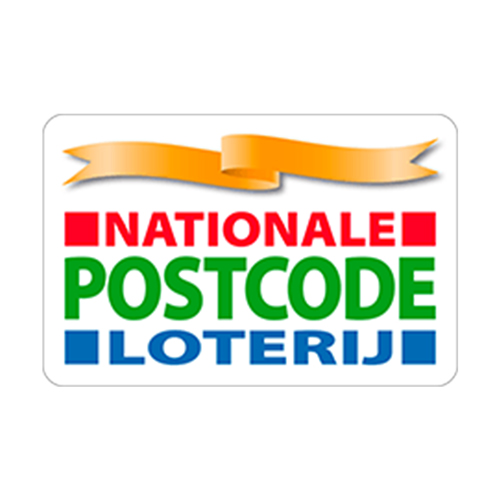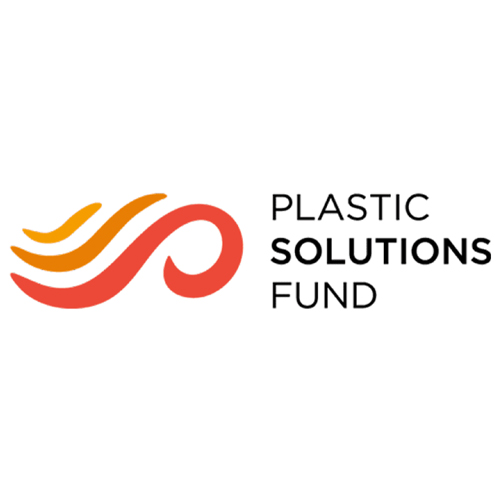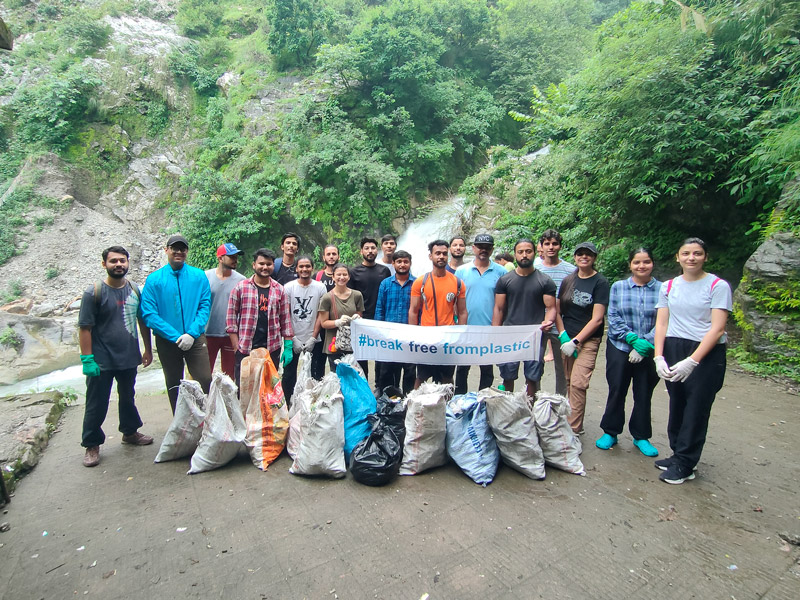One who thinks about the Himalayas will have a pristine image of snow mountains, meandering streams, vast green alpine meadows with dotted pine trees. But due to the increase in their tourism industry, the immense beauty of nature and biodiversity is affected slowly.
A study published in The Journal for Nature Conservation reported an alarming presence of plastics and other materials were found in elephant dung from the forests of the state of Uttarakhand¹. This is the first documentation that provides proof that elephants in that region of India are ingesting non-biodegradable, toxic anthropogenic plastic wrapped in discarded food waste, which is moving to their digestive systems. Additionally, According to the main author of the study, the dung samples collected in the protected areas contained nearly twice as many plastic particles compared to the samples from the forest edge. It proves that along with ingesting plastic waste, it is carried deep in the forest and can be a danger to other animals from the food chain.
In this Member Story, we're featuring Abhishek Rawat, a BFFP Youth Ambassador, who is the founder of youth based NGO Nature's Buddy. The organization is working to protect the environment, wildlife, and bring socio-economic changes in the Himalayan region of Uttarakhand. They are a team of 12 core members and 300+ volunteers which are called Buddies across Uttarakhand. The goal of the organization is to work on environmental and socio-economic issues and communicate results. To promote public education, awareness, and actions on environmental aspects and sustainable development.
“We all youth are born and brought up in mountains and witness the immense beauty since childhood, but due to rapid increase of plastic waste we are losing our mountains and environment. So, our main objective is to target brands who are responsible for polluting our pristine mountains through brand audit and urge them to collect their waste from mountains through grassroot mechanisms and redesign alternative eco-friendly packaging for their products.” explains Abhishek.
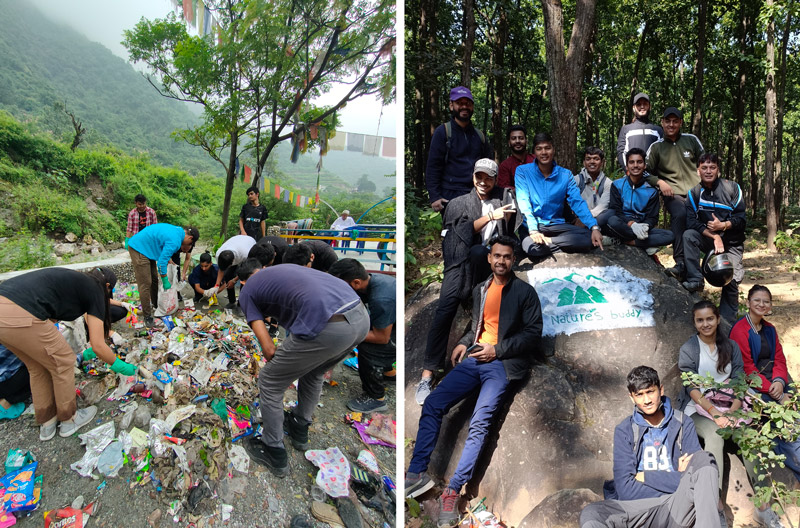
Photo credit: Nature’s Buddy
Key results from Nature’s Buddy activities are: 1) Make our volunteers and local people aware about the negative impact of plastic in our environment and lifestyle. 2) Explain about the false solutions of brands, what they say and what they actually do. 3) Elucidate about new EPR law policy which is implemented on 1 July 2022 in India. 4) Guarantee that the top polluter brand got in pressure after knowing about the actions campaign of brand audit conducted by volunteers through active participation.
In August 2021, the Indian federal government amended the ban on manufacture, import, stocking, distribution, sale and use of identified single-use plastic items that are considered low utility and have high littering potential. In February 2022, the Indian federal government also released guidelines on Extended Producer Responsibility (EPR), which is the responsibility of a producer for the environmentally sound management of the product until the end of its life. Both these amendments are effective July 1, 2022.
This 2022 is Nature’s Buddy second Brand Audit campaign year with Break Free From Plastic. With the help of 238 youth volunteers, the organization audited more than 7000 items across Himalayan region of Uttarakhand. According to the survey, the most common type of waste were plastic wrappers, small plastic sachets, plastic bottles, straws and many more. PepsiCo and Haldirams were the top-polluted brands. The team was able to collect, manage, and personally handover the waste to their respective headquarters after traveling 350 km distance. The organization stated, “We urge the brands to collect their waste from mountains and also to redesign alternative eco-friendly packaging”.
Abhishek shared his visions on the participation of youth to protect the environment: “for us volunteers are Youth who are our future generations. They are aware of how plastic is harmful for the environment and how it is directly affecting our lifestyle. Engage them in different activities, provide them leadership, encourage them through advocacy, education, research and action programs”. Regarding how the volunteers feel about participating in the brand audit, Abshishek says: “They feel great. For them, it was something new. Love to see how dedicatedly they work in each and every campaign.”
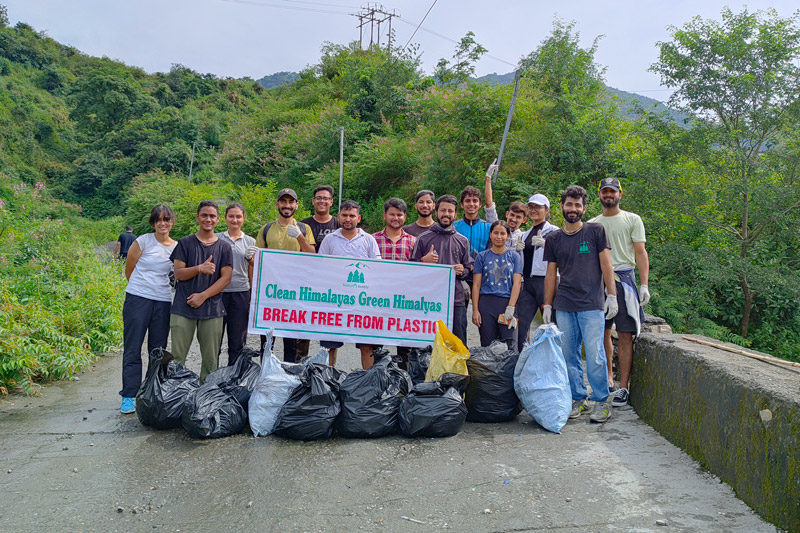
Photo credit: Nature’s Buddy
To keep updated about the Brand Audit campaigns Himalayan region of Uttarakhand, follow Nature’s Buddy on Instagram and Facebook.
Are you a teacher and want to learn more about how to integrate Plastic-free Education Curriculum into your own lesson plans? Break Free From Plastic is launching their first ever training program for educators.
Learn more about the map for science-integrated Plastics Education for Teachers.
Young people aged from 15 to 24 represent 16% percent of the global population, and are dealing with a plastics crisis that they did not create. To learn more about how the youth are taking action towards lasting solutions to the plastic pollution crisis, check the BFFP Youth page.
Sources:
¹Gitanjali Katlam, et al, Plastic ingestion in Asian elephants in the forested landscapes of Uttarakhand, India, Journal for Nature Conservation, Volume 68, 2022. DOI: https://doi.org/10.1016/j.jnc.2022.126196.
²Ministry of Environment, Forest and Climate Change. Ban on identified Single Use Plastic Items from 1st July 2022. Available on: https://pib.gov.in/PressReleasePage.aspx?PRID=1837518. Accessed on 07 December 2022.
